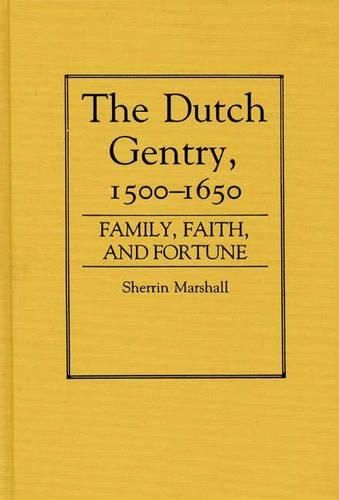
The Dutch Gentry, 1500-1650: Family, Faith, and Fortune
(Hardback)
Publishing Details
The Dutch Gentry, 1500-1650: Family, Faith, and Fortune
By (Author) Sherrin Marshall
Bloomsbury Publishing PLC
Praeger Publishers Inc
15th April 1987
United States
Classifications
Tertiary Education
Non Fiction
305.523209492
Physical Properties
Hardback
252
Description
This detailed study of Dutch gentry families affords many valuable historical insights and challenges current assumptions about the nature of family life during the early modern period. Marshall offers an in-depth portrait of the Dutch gentry, their family organization and relationships, and the role of lineage, religion, law, and custom, economics, and politics in their daily lives.
Reviews
Family studies in early modern history have become a battlefield littered with conflicting interpretations of hierarchy, patriarchy, amount of individualism, nature of marriage, origins of childhood, and so on. Now Sherrin Marshall brings to the field the Dutch, a society often portrayed as bourgeois and dominated by restraint and propriety. Marshall examines the families of the gentry--the lesser nobility--in the bourgeois republic' and offers a new interpretation of the Revolt of the Netherlands.... The family material reads easily and is wonderfully devoid of jargon.... The text, which is more descriptive than analytical, supplies a variety of evidence that does not refute previous views of the family but rather surmounts them, often producing a middle ground in the historiographical debates. By avoiding pamphlets, sermons, and the like, which often theorize about families, and relying instead on documents such as wills, court testimony, and letters--sources in which people do not talk much about ideologies--Marshall produces few generalizations and much nuance. She concludes that the gentry sought and obtained reciprocity in their family affairs and expected it elsewhere--in religion and politics especially.-Journal of Marriage and the Family
Marshall studies the Dutch gentry in Utrecht province over three generations, utilizing a wide variety of archival and genealogical sources. The author writes that reciprocal relationships were the critical elements within the gentry family. Members of the core family possessed certain rights in relation to each other. Affectional feelings between husbands and wives, and parents and children, were quite real. Children were perceived as being children, not as some type of adult, and family members could often choose whom they married. The gentry exhibited an intense devotion to their lineage, and treated the ancestral holdings as a sacred trust to be improved and then passed on to the next generation. Marshall also studies the gentry's strong religious beliefs, economic affairs, and role in the Dutch Revolt. The author concludes that although the revolt brought substantial change to certain families, the gentry's basic concepts survived the uprising and influenced the Dutch Republic's government. Overall, Marshall's excellent study sees Dutch society during this period as being structurally closer to modern Europe than those in other countries. Upper-division undergraduates and above.-Choice
This detailed study of Dutch gentry families affords many historical insights and challenges and current assumptions about the nature of family life during the early modern period. Marshall offers an in-depth portrait of the Dutch gentry, their family organization and relationships, and the role of lineage, religion, law, custom, economics, and politics in their daily lives.-Journal of the California Graduate School of Family Psychology
"Marshall studies the Dutch gentry in Utrecht province over three generations, utilizing a wide variety of archival and genealogical sources. The author writes that reciprocal relationships were the critical elements within the gentry family. Members of the core family possessed certain rights in relation to each other. Affectional feelings between husbands and wives, and parents and children, were quite real. Children were perceived as being children, not as some type of adult, and family members could often choose whom they married. The gentry exhibited an intense devotion to their lineage, and treated the ancestral holdings as a sacred trust to be improved and then passed on to the next generation. Marshall also studies the gentry's strong religious beliefs, economic affairs, and role in the Dutch Revolt. The author concludes that although the revolt brought substantial change to certain families, the gentry's basic concepts survived the uprising and influenced the Dutch Republic's government. Overall, Marshall's excellent study sees Dutch society during this period as being structurally closer to modern Europe than those in other countries. Upper-division undergraduates and above."-Choice
"This detailed study of Dutch gentry families affords many historical insights and challenges and current assumptions about the nature of family life during the early modern period. Marshall offers an in-depth portrait of the Dutch gentry, their family organization and relationships, and the role of lineage, religion, law, custom, economics, and politics in their daily lives."-Journal of the California Graduate School of Family Psychology
"Family studies in early modern history have become a battlefield littered with conflicting interpretations of hierarchy, patriarchy, amount of individualism, nature of marriage, origins of childhood, and so on. Now Sherrin Marshall brings to the field the Dutch, a society often portrayed as bourgeois and dominated by restraint and propriety. Marshall examines the families of the gentry--the lesser nobility--in the bourgeois republic' and offers a new interpretation of the Revolt of the Netherlands.... The family material reads easily and is wonderfully devoid of jargon.... The text, which is more descriptive than analytical, supplies a variety of evidence that does not refute previous views of the family but rather surmounts them, often producing a middle ground in the historiographical debates. By avoiding pamphlets, sermons, and the like, which often theorize about families, and relying instead on documents such as wills, court testimony, and letters--sources in which people do not talk much about ideologies--Marshall produces few generalizations and much nuance. She concludes that the gentry sought and obtained reciprocity in their family affairs and expected it elsewhere--in religion and politics especially."-Journal of Marriage and the Family
Author Bio
SHERRIN D. MARSHALL, currently Director of Academic Advising at Salem State College, has lectured extensively on early modern and modern European history.
